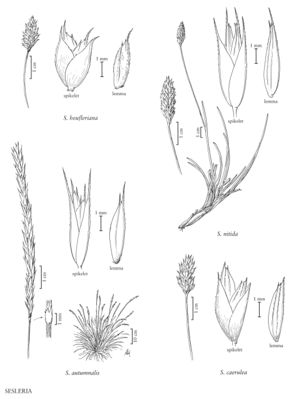Difference between revisions of "Sesleria heufleriana"
FNA>Volume Importer |
imported>Volume Importer |
||
| (7 intermediate revisions by 2 users not shown) | |||
| Line 25: | Line 25: | ||
-->{{#Taxon: | -->{{#Taxon: | ||
name=Sesleria heufleriana | name=Sesleria heufleriana | ||
| − | |||
|authority=Schur | |authority=Schur | ||
|rank=species | |rank=species | ||
| Line 32: | Line 31: | ||
|basionyms= | |basionyms= | ||
|family=Poaceae | |family=Poaceae | ||
| + | |illustrator=Annaliese Miller | ||
| + | |illustration copyright=Utah State University | ||
|reference=None | |reference=None | ||
|publication title= | |publication title= | ||
|publication year= | |publication year= | ||
|special status= | |special status= | ||
| − | |source xml=https:// | + | |source xml=https://bitbucket.org/aafc-mbb/fna-data-curation/src/200273ad09963decb8fc72550212de541d86569d/coarse_grained_fna_xml/V24/V24_960.xml |
|subfamily=Poaceae subfam. Pooideae | |subfamily=Poaceae subfam. Pooideae | ||
|tribe=Poaceae tribe Poeae | |tribe=Poaceae tribe Poeae | ||
Latest revision as of 16:26, 11 May 2021
Plants cespitose, not rhizomatous, rarely stoloniferous, green when young, becoming glaucous and blue in early summer. Culms 25-80(100) cm; exposed nodes 1-2. Leaves mostly basal; sheaths glabrous; ligules 0.2-0.5 mm, ciliate; blades of cauline leaves 0.8-5 cm long, 2-4(5.5) mm wide, acute or acuminate; blades of flag leaves 1-2.1 cm. Panicles (1)1.5-4(8) cm long, 7-11 mm wide, dense, ovoid to cylindrical. Spikelets 3-6 mm, with 2^1 florets, glaucous. Glumes 3-4 mm, ovate-lanceolate, coriaceous, sparsely ciliate on the veins and margins, 1-veined, narrowing to 0.5-2.5 mm awnlike apices; lemmas 3-4 mm, ovate to elliptic, pubescent, apices awned and toothed, central veins terminating in a 1-4 mm awn, lateral veins forming teeth shorter than 1 mm; paleas 3-5 mm, hairy, 2-awned, awns 0.2-1.5 mm; anthers about 4 mm. 2n = unknown.
Discussion
Sesleria heufleriana is native to east-central Europe, where it grows in woods and on rocks, usually over calcareous substrates. It is grown as an ornamental in the Flora region.
Selected References
None.
